Fick equation - Study guides, Class notes & Summaries
Looking for the best study guides, study notes and summaries about Fick equation? On this page you'll find 146 study documents about Fick equation.
Page 2 out of 146 results
Sort by
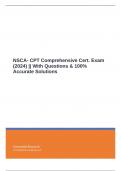
-
NSCA- CPT Comprehensive Cert. Exam (2024) || With Questions & 100% Accurate Solutions
- Exam (elaborations) • 11 pages • 2024
- Available in package deal
-
- $10.99
- + learn more
NSCA- CPT Comprehensive Cert. Exam (2024) || With Questions & 100% Accurate Solutions NSCA- CPT Comprehensive Cert. Exam (2024) || With Questions & 100% Accurate Solutions What is the equation that represents Work (W) - ANSWER - Force x Distance moved (displacement) What is correct regarding rate of force development - ANSWER - It is the ratio of the change in force over the change in time, it is time rate of change of force, and it can be improved with resistance training What is corr...
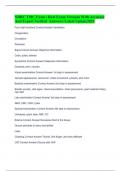
-
NBRC TMC Exam | Real Exam Versions With Accurate And Expert Verified Answers| Latest Update2024
- Exam (elaborations) • 35 pages • 2024
- Available in package deal
-
- $10.48
- + learn more
NBRC TMC Exam | Real Exam Versions With Accurate And Expert Verified Answers| Latest Update2024 Four vital functions Correct Answer Ventilation Oxygenation Circulation Perfusion Signs Correct Answer Objective information Color, pulse, edema Symptoms Correct Answer Subjective information Dyspnea, pain, nausea Visual examination Correct Answer 1st step in assessment General appearance, sensorum, chest movement, posture, skin color Bedside examination Correct Answe...
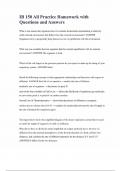
-
IB 150 All Practice Homework with Questions and Answers
- Exam (elaborations) • 45 pages • 2024
- Available in package deal
-
- $7.99
- + learn more
IB 150 All Practice Homework with Questions and Answers What is one reason that organisms have to maintain homeostasis (maintaining a relatively stable internal environment that differs from the external environment)? ANSWER Organisms have to perpetually keep themselves out of equilibrium with the environment. What can you conclude about an organism that has reached equilibrium with its external environment? ANSWER The organism is dead. Which of the cell shapes in the previous question ...
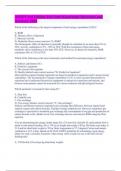
-
ASPEN 3rd Edition Test Your Knowledge Questions and Answers. 2024
- Exam (elaborations) • 42 pages • 2023
- Available in package deal
-
- $13.49
- + learn more
Which of the following is the largest component of total energy expenditure (TEE)? A. RMR B. Thermic effect of digestion C. Physical Activity D. Metabolic Stress correct answers *A. RMR* The thermogenic effect of digestion is generally thought to contribute to no more than 10% to TEE. Activity contributes to 5% - 30% to TEE. With the exceptions of burn and sepsis, metabolic stress contributes to less than 50% TEE. However, in almost all situations, RMR constitutes 60% to 75% of TEE. Wh...
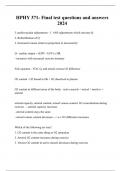
-
HPHY 371- Final test questions and answers 2024
- Exam (elaborations) • 18 pages • 2024
- Available in package deal
-
- $13.49
- + learn more
3 cardiovascular adjustments - 1. ANS adjustments which increase Q 2. Redistribution of Q 3. Increased venous return in proportion to increased Q Q - cardiac output = (EDV - ESV) x HR - increases with increased exercise intensity Fick equation - VO2, Q, and aterial-venous O2 difference O2 content - O2 bound to Hb + O2 dissolved in plasma O2 content in different areas of the body - active muscle < mixed < inactive < arterial arterial capacity, arterial content, mixed ve...
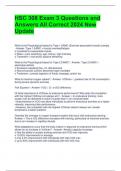
-
HSC 308 Exam 3 Questions and Answers All Correct 2024 New Update
- Exam (elaborations) • 7 pages • 2024
- Available in package deal
-
- $13.49
- + learn more
HSC 308 Exam 3 Questions and Answers All Correct 2024 New Update What is the Physiological bases for Type 1 EAMC (Exercise associated muscle cramps) - Answer- Type 1 EAMC = muscle overload/fatigue o Localized to overworked muscle o Risks = poor stretching, age, history, high intensity o Treatment = rest and/or passive stretching What is the Physiological bases for Type 2 EAMC? - Answer- Type 2 EAMC = electrolyte deficits o Excessive sweating Na+, Cl- disturbances o Neuromuscular jun...
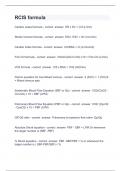
-
RCIS formula Question and answers verified to pass
- Exam (elaborations) • 4 pages • 2024
- Available in package deal
-
- $13.99
- + learn more
RCIS formula Question and answers verified to passRCIS formula Cardiac output formula - correct answer HR x SV = CO (L/min) Stroke Volume formula - correct answer EDV- ESV = SV (mL/min) Cardiac Index formula - correct answer CO/BSA = CI (L/min/m2) Fick CO formula - correct answer VO2/(CaO2-CvO2) x10 = Fick CO (L/min) VO2 formula - correct answer 125 x BSA = VO2 (O2/min) Flamm equation for true Mixed Venous - correct answer 3 (SVC) + 1 (IVC)/4 = Mixed venous sats ...
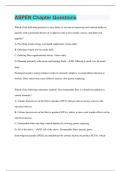
-
ASPEN Chapter Questions
- Exam (elaborations) • 20 pages • 2024
-
- $9.99
- + learn more
ASPEN Chapter Questions Which of the following practices is most likely to succeed in improving oral nutrient intake in patients with a prolonged history of weight loss due to poor intake, nausea, and depressed appetite? A. Providing a high-energy oral liquid supplement 3 times daily B. Offering 6 small, low-fat meals daily C. Ordering fiber-supplemented snacks 3 times daily D. Planning primarily solid meals and limiting fluids - B. Offering 6 small, low-fat meals daily Prolonged nega...
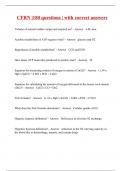
-
CFRN |180 questions | with correct answers
- Exam (elaborations) • 20 pages • 2023
- Available in package deal
-
- $13.99
- + learn more
Volume of normal cardiac output and respired air? - Answer 4-8L/min Aerobic metabolism of ATP requires what? - Answer glucose and O2 Byproducts of aerobic metabolism? - Answer CO2 and H2O How many ATP molecules produced in aerobic state? - Answer 36 Equation for measuring content of oxygen in arteries (CaO2)? - Answer (1.34 x Hgb x SaO2) + 0.003 x PO2 = CaO2 Equation for calculating the amount of oxygen delivered to the tissues each minute (Do2)? - Answer CaO2 x CO = D...
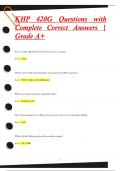
-
KHP 420G Questions with Complete Correct Answers | Grade A+
- Exam (elaborations) • 22 pages • 2024
- Available in package deal
-
- $11.49
- + learn more
True or false: Red blood cells do not have a nucleus. Ans: True Which of the following formulas represents the FICK equation? Ans: VO2 = Qxa - vO2 difference What is another name for red blood cells? Ans: Erthyrocytes The atrial contraction or 'Kick' accounts for what % of ventricular filling? Ans: 30% Which of the following describes cardiac output? Ans: SV x HR 2 What does erthyropoitein do? Ans: Regulates red blood cell production by stimulating bone marrow cells Which defines ...

$6.50 for your textbook summary multiplied by 100 fellow students... Do the math: that's a lot of money! Don't be a thief of your own wallet and start uploading yours now. Discover all about earning on Stuvia


